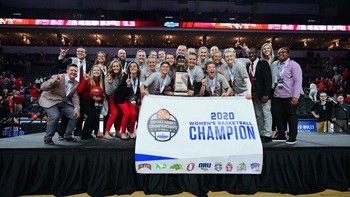USD students are finalists in national renewable energy competition
With the project, “LTEC: Expanding the Viability of Geothermal Energy,” Chris Barkl of Yankton, S.D., Nathan Bedoya of Tustin, Calif., Kyle Poss of Dakota Dunes, S.D., and Jordan Schumacher of Aberdeen, S.D., were named one of four finalists in the competition, awarded $5,500 and a paid trip to Reno, Nev., this summer where they presented their proposal to a panel of geothermal experts. The U.S. Department of Energy’s Geothermal Technologies Office coordinates this annual competition through the Oak Ridge Institute for Science and Education. Other finalists included teams from Oregon Institute of Technology, Cal Poly-Pomona and Rochester University.
According to Meghann Jarchow, Ph.D., assistant professor of sustainability at USD, the competition was designed to include students from multiple academic departments. USD’s team featured a general studies major (Poss), two students in the Beacom School of Business (Barkl, an accounting major, and Schumacher, a finance major) and a sustainability major (Bedoya). Poss, Barkl and Schumacher were also part of the Southeast Entrepreneurial Resource Program under the direction of Wade Druin, assistant professor of entrepreneurship at the Beacom School of Business. Druin also served as the team’s adviser.
The proposal submitted, “LTEC: Expanding the Viability of Geothermal Energy,” utilizes both traditional geothermal energy conversion and ocean thermal energy conversion for a clean and economically viable result. The USD team used Lake Francis Case, which sits behind Fort Randall Dam near Pickstown, S.D., as the proposed location for their LTEC (Land Thermal Energy Conversion) geothermal plant.
“In the Lake Francis Case area, there is a good source of geothermal energy which is relatively close to the surface and would work well in conjunction with the relatively cool water from the lake,” explained Druin, who also co-owns a geothermal business in Sioux Falls.
Geothermal energy uses the heat from beneath the earth’s surface as a fuel source. It’s clean and sustainable, which is appropriate now that sustainability is the newest major in the College of Arts & Sciences. Jarchow, who oversees the program, said interest in sustainability has increased in just three semesters at USD with 12 declared majors at the end of last year.
“All of the other schools have a geothermal program dedicated to investigating these resources and opportunities,” Jarchow noted. “I think this competition was an invaluable experience for our students because they were going up against students who were getting graduate degrees in geothermal energy.”


